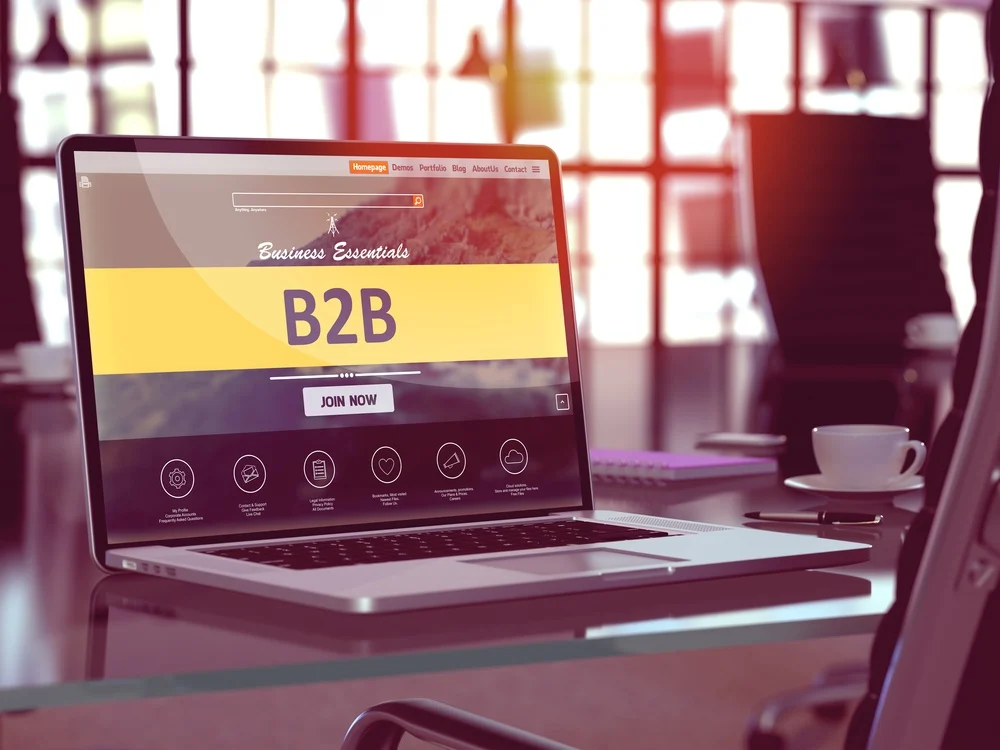Sitting behind almost all successful B2B businesses in 2023 are good B2B eCommerce platforms. These enable them to stand out from the crowd and avoid losing customers to competitors such as Amazon.
Unfortunately, there is a bewildering choice of eCommerce software solutions, both good and bad. Mercifully, most decent B2B eCommerce platforms embed a common set of features aimed at giving your business a head start when transitioning online. This article lists those features and explains why they are essential in addressing the needs of online buyers and helping B2B sellers grab and retain their share of the online market.
What Features Should Good B2B eCommerce Platforms Have?

Most people already buy online as it’s convenient, efficient and easy to shop around for the best deals. So, it’s no more surprising that now businesses also recognise procuring goods online can be more effective than using traditional methods.
Current estimates show that around half of B2B businesses have already embraced eCommerce, the figure is predicted to hit almost 100% within the next few years. As such, if your business does not have already a solid eCommerce presence already, there will come a point where it will lose out to competitors who have already made the transition.
Creating an online presence is not as difficult as you think! Many, ‘out-of-the-box’ B2B eCommerce platforms are available.
The following is a list of ten essential features that you should look for when considering investing in such a platform.
-
Access Controls
B2C customers are usually individuals buying for themselves. In contrast, B2B customers are invariably employees buying on behalf of a company, each having different roles and responsibilities. Therefore, a B2B eCommerce platform must be configurable to grant each user access only to the information they need to do their job.
Buyers are generally the most common category of users in a company. Although, that role is commonly split by seniority. Therefore, a firm may have purchasing managers permitted to work with sensitive documents like invoices, orders, tax codes, etc., while the junior buyers they supervise may have access limited to quotations, prices and shopping lists only.
-
Corporate Account Management
Due to their multi-level structures and number of employees, B2B customers demand a much more personalised user experience than B2C customers. Therefore, your B2B eCommerce platform must be capable of handling complex, hierarchical corporate account structures. Furthermore, it must allow individual buyers to set up their own account management structures, add authorised users, and create purchasing rules. All of this should be possible irrespective of the number of businesses, teams, departments, offices, or branches the customer has.
-
Multiple Organisations, Websites and Stores
Businesses often comprise multinational brands, sub-brands, and divisions operating in several geographic locations using a variety of currencies and tax regimes. As your business may have multiple websites with different personnel responsible for each, ideally, your B2B eCommerce platform should be capable of dealing with all such scenarios under one roof.
-
Content Management System
B2C customers purchase on impulse and often with limited or no fixed criteria in mind. In contrast, B2B buyers procure items needed for a specific purpose and often need them delivered at a particular time. Before committing to a purchase, the buyer must be confident that they are getting precisely what is required and that it will arrive when they need it.
Therefore, B2B customers want to see detailed product descriptions, data sheets, certifications, videos, stock availability, delivery times, etc. In a nutshell, they want their questions answered without even asking them. As such, an essential feature of all good B2B eCommerce platforms is a robust content management system (CMS) that gets the appropriate information in front of the right customers.
-
Personalised Catalogue Management
Nowadays, B2B customers don’t have the time or inclination to trawl through tons of product literature to find what they are looking for – they want personalised information tailored to their individual needs.
Therefore, your chosen eCommerce solution must have personalised B2B catalogue management that allows you to provide customised product catalogues to every business level, from specific corporations, through divisions and business units, right down to individual buyers or customers.
-
Multiple Price Lists
B2B eCommerce pricing is considerably more complex than in B2C thanks to factors such as order volume, discounts, purchasing frequency, etc. Furthermore, pricing may be calculated dynamically based on specific business and pricing rules.
Therefore, a good B2B eCommerce platform will be capable of creating customised price lists for each customer, whether they are an individual, company, or business unit. Moreover, the platform should be able to handle price lists in different currencies and tax jurisdictions.
-
Multiple Shopping Lists
Most B2B customers are busy people, handling several projects simultaneously or procuring numerous products for different departments and individuals. This means they may have several shopping lists open at any given time.
A good B2B eCommerce platform will allow customers to open multiple shopping lists. But, at the same time, they will also appreciate time-saving features like bulk actions, list duplication, order placement directly from lists, etc.
-
Segmentation and Customisable Reports
Data gathered about your customers is the Holy Grail of account-based marketing, segmentation, and customer behaviour analytics. As such, your B2B eCommerce platform must be able to capture that data. It should also track KPIs and assess how those are affected by things like different marketing tactics, user experience tweaks, or new product launches.
Having reams of data is fine and dandy but useless when not presented correctly. Therefore, a good B2B eCommerce platform should be capable of producing reports customised to your needs. That will help you understand your customers’ purchasing behaviours so that you can run targeted marketing campaigns at the most appropriate times.
-
Customisable Workflows
Flexibility to adapt to both current and future conditions is crucial with any system. Therefore, B2B eCommerce platforms should be capable of creating as many custom workflows as necessary to support buyer and seller-related processes.
-
Self-Service Facilities
Like B2C customers, B2B customers increasingly prefer to do many things themselves online rather than make phone calls or attend meetings. In this respect, decent B2B eCommerce solutions allow business buyers to easily request quotations, place or modify orders, track shipments, and the like. Ideally, the platform should be able to personalise these self-service capabilities to each customer, as that will help build stronger relationships with them.
‘Nice to Have’ B2B eCommerce Features

The ten features discussed above are the minimum any good B2B eCommerce platform should possess if the solution is to help you achieve your goal of creating a solid eCommerce presence.
There are, of course, many other features that your business may or may not need. Here are three which are not essential but highly desirable as they can help improve customer experience and operational efficiency:
-
Payment and Invoicing Options
Unlike in B2C, B2B transactions are complex and vary between companies. For example, one company may wish to pay on delivery using a credit card or bank transfer, while another may want credit terms.
Therefore, it is helpful if a B2B eCommerce platform can manage a variety of payment methods and terms. Furthermore, it is even better if it can synchronise orders with your existing accounting and financial systems.
-
Integration Options
We already mentioned syncing with accounting and financial systems, and the more your B2B eCommerce platform can integrate with your other systems and processes, the more streamlined your business operations will be.
Think in terms of real-time inventory updates, pricing consistency, order synchronisation, etc., and how streamlining those will improve the running of your business and enhance the experience for your customers.
-
Streamlined Buyer-Seller Interaction
No B2B eCommerce website can completely substitute a human salesperson. However, they can significantly streamline buyer-seller interactions, for example, by letting customers create and submit inquiries, RFQs, and orders electronically and allowing sellers to respond via the same platform.
Get on the Road to Success by Choosing the Right B2B eCommerce Platform
The key to choosing the right B2B eCommerce platform is understanding the needs of both your business and your customers. Furthermore, you also must consider the future – what will your and your customers’ businesses look like in one, three, and five years from now, and what will the needs of those businesses be?
Please don’t be tempted to select a platform simply because it has all the bells and whistles. Of greater importance is, does it tick all the essential boxes, and will it be able to check the right ones in the future also? It’s no use having a platform that works great today but cannot expand with your business or keep your customers happy further down the line.
Choose your B2B eCommerce plan carefully, taking on board the ten essential features we talked about, and it will serve your business well and please your customers for years to come.

